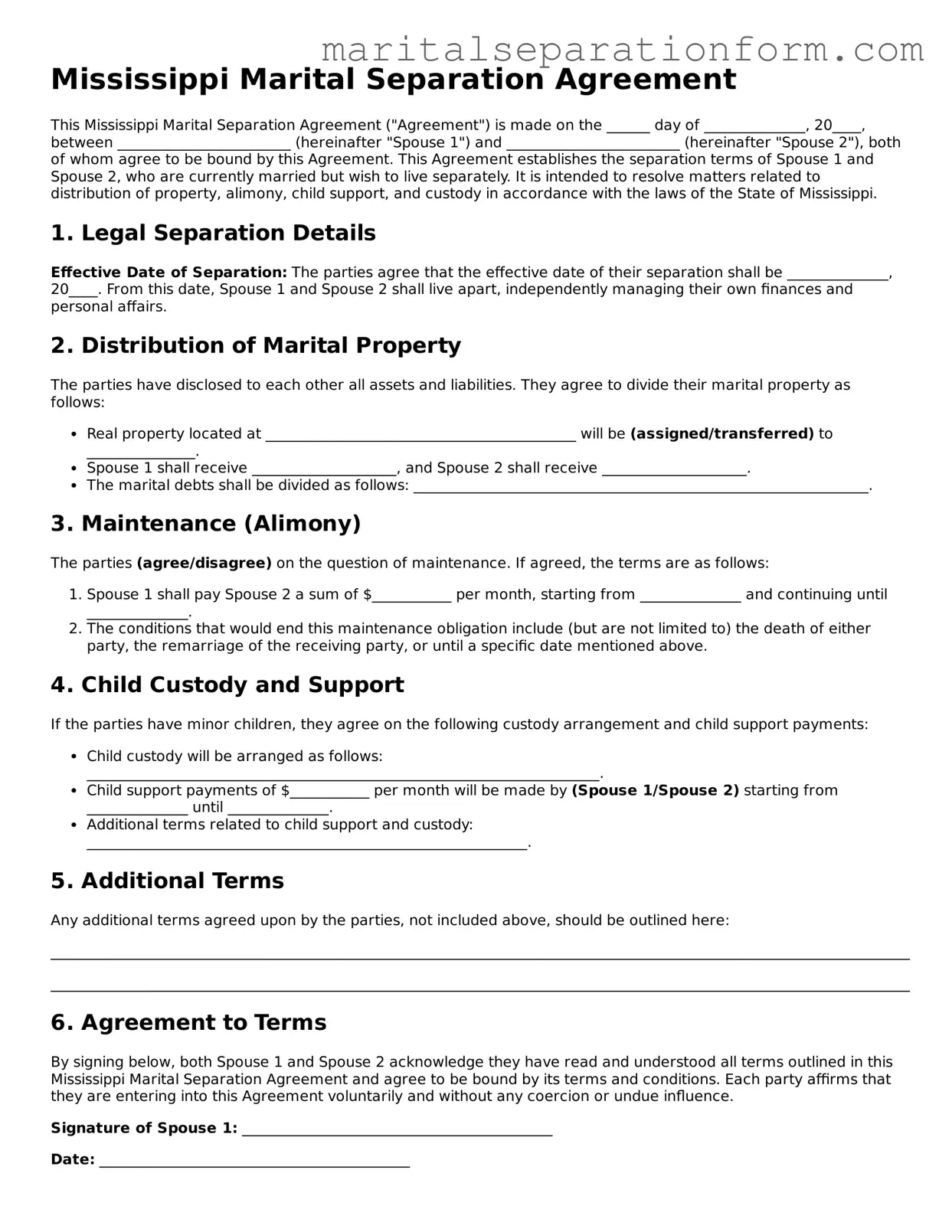What is a Mississippi Marital Separation Agreement?
A Mississippi Marital Separation Agreement is a formal document that outlines how a married couple has decided to live apart, detailing the terms of their separation. It covers crucial aspects such as asset division, debt responsibility, alimony, child support, and custody arrangements (if applicable). This agreement is essential for legally defining the separation terms without finalizing a divorce.
Do I need a lawyer to create a Mississippi Marital Separation Agreement?
While it's not mandatory to hire a lawyer to draft a Marital Separation Agreement in Mississippi, seeking legal advice can ensure that the agreement is fair, comprehensive, and legally binding. A lawyer can also help navigate complex issues, such as division of property or child custody arrangements, ensuring both parties' rights are protected.
Is a Marital Separation Agreement legally binding in Mississippi?
Yes, once signed by both parties, a Marital Separation Agreement becomes a legally binding contract in Mississippi. For additional legal strength, the agreement can be filed with the court, though this is not a requirement. Violations of this agreement are subject to legal repercussions, similar to any other breach of contract.
Can we modify our Mississippi Marital Separation Agreement after it's been signed?
Modifications to a Marital Separation Agreement after signing are permissible, provided both parties consent to the changes. To amend the agreement, the revisions should be written, signed, and, ideally, notarized. For greater enforceability, the modified agreement should also be filed with the court.
What happens if we reconcile after creating a Marital Separation Agreement?
If a couple decides to reconcile after entering into a Marital Separation Agreement, they may choose to nullify the agreement. It's advisable to execute a new document that officially declares the cancellation of the separation agreement, ensuring clarity on the status of their relationship and mutual obligations.
Does a Marital Separation Agreement cover child support and custody in Mississippi?
Yes, a Marital Separation Agreement in Mississippi can and should include terms regarding child support, custody, and visitation rights. It's crucial for these arrangements to be clearly defined, prioritizing the children's best interests and conforming to Mississippi's legal standards for child support and custody.
How long does a Marital Separation Agreement last in Mississippi?
The duration of a Marital Separation Agreement in Mississippi depends on the terms set by the parties involved. It may remain in effect until a specified date, until the couple files for divorce, or indefinitely. The couple can also decide to review and update the agreement regularly.
Can a Marital Separation Agreement be used as grounds for divorce in Mississippi?
In Mississippi, living apart under the terms of a Marital Separation Agreement can be used as evidence of separation, which is one of the grounds for a no-fault divorce if the separation has lasted for at least 60 consecutive days. However, consulting with a lawyer can provide guidance based on the specific circumstances and latest laws.
What should be included in a Mississippi Marital Separation Agreement?
A comprehensive Mississippi Marital Separation Agreement should include: division of assets and liabilities, alimony or spousal support arrangements, child support, custody, and visitation schedules (if applicable), and any other terms pertinent to the separation, such as who remains in the family home. It should also contain both parties' full legal names, the date the agreement goes into effect, and signatures.
How does a Marital Separation Agreement impact taxes in Mississippi?
The implications of a Marital Separation Agreement on taxes can vary. For instance, alimony payments were once deductible for the payer and taxable for the recipient, but tax laws change. It's essential to consult with a tax advisor or accountant to understand current tax laws and how they apply to your situation, ensuring compliance and optimizing financial outcomes.

